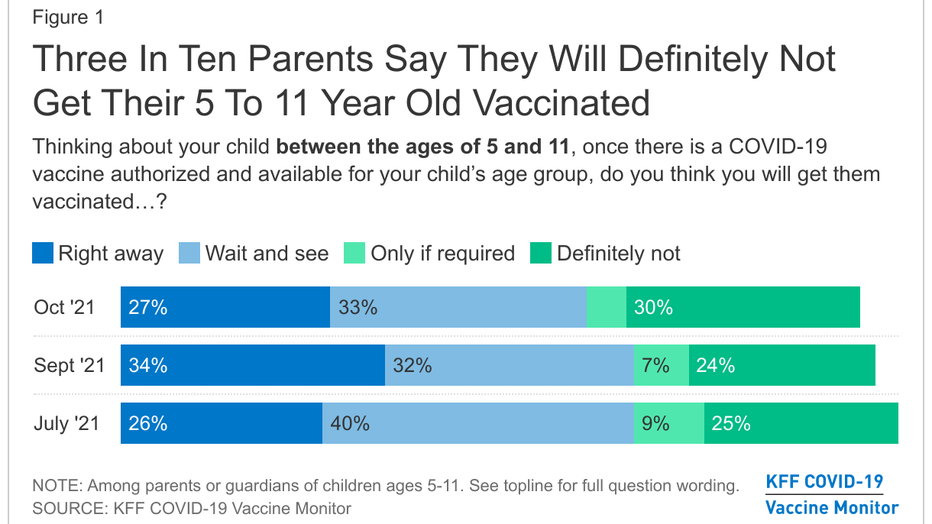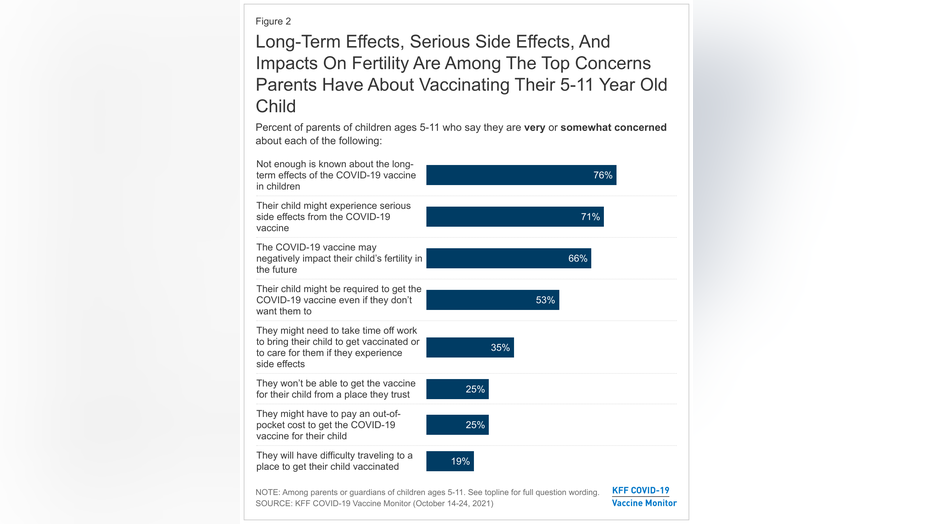About a third of parents say they definitely won't get their 5- to 11-year-olds vaccinated against COVID

Why are some parents hesitant about vaccinating their children?
A new Kaiser Family Foundation survey shows that even when Pfizer's covid-19 vaccine is approved for kids ages 5-11 next week, many parents are still hesitant about vaccinating their young children right away. KTVU's Amanda Quintana reports.
SAN FRANCISCO - On Friday, the U.S. Food and Drug Administration approved Pfizer's COVID-19 vaccine for emergency use in children ages 5 to 11. Next, the Center for Disease Control and Prevention will make its recommendations. That meeting is scheduled for Tuesday.
But a new Kaiser Family Foundation survey shows that even when the approval comes, likely next week, many parents are still hesitant about vaccinating their young children right away.
The survey shows parents are almost evenly split into thirds on the topic. About ⅓ of parents surveyed say they definitely won't get their child vaccinated, a little less than ⅓ will do it right away and about ⅓ will wait and see.

Dr. Yvonne Maldonado, a professor of pediatrics and the lead investigator of Pfizer's clinical trial for kids at Stanford, said the vaccine is safe and demonstrating 90% effectiveness for kids.
She wants parents to understand that the mRNA platforms used by Pfizer and Moderna are not new, and the vaccines were put through rigorous testing.
"From the very beginning of the pandemic we heard a lot of bad information that children don’t get infected or that they don’t get symptoms or that they don’t spread to others, and all of those are incorrect," said Maldonado. "It is hospitalizing thousands of children in the U.S. alone. We shouldn’t have children in the hospital at all from a preventable disease like this, and it is now preventable through vaccination."
Though severe cases of COVID in kids are still uncommon, the delta variant is quickly spreading among that age range.
"Those kids, though that are usually safe, are still serving as vectors. So they can transmit this very transmissible variant and basically the issue doesn’t go away," said Dr. Vanila Singh.
Singh, the former chief Medical Officer in the U.S. Department of Health and Human Services and a clinical associate professor at Stanford said from a public health perspective, kids are part of society. And we need them to contribute to society's immunity in order to move past this pandemic.
"Overall, I think the idea is that it will help people really get back to normal, which people are definitely wanting," said Singh.
The KFF survey found that some of the biggest worries parents have are about long and short term side effects of the vaccines, and the impact on their child's fertility. Although the CDC has said there is no evidence that the vaccines cause fertility problems.

Dr. Maldonado said misinformation is causing a lot of the fear surrounding vaccines.
"We need to make sure at a global level that the companies that put out social media are really responsible for stopping this misinformation that’s going out," said Maldonado.
Dr. Singh doesn't want any parent to feel stigmatized, instead she wants pediatricians to welcome any questions and concerns, and be transparent with the data.
"Yes, the more vaccinations the better, but I don’t necessarily support forcing parents or making them feel forced because that has really this undesirable effect, which we’ve seen," said Singh.
Both Maldonado and Singh encourage any parents who are hesitant about the vaccine to talk to their pediatrician. They can help put all of the information into context for your family.

